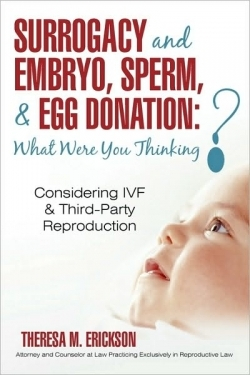Surrogacy and Embyo, Sperm and Egg Donation
What Were You Thinking? Considering IVF & Third-Party Reproduction
“Knowing is not enough; we must apply. Willing is not enough; we must do,” said Goethe. He meant that practical knowledge is the best kind, and that endeavoring to find new experiences in one’s field is the best way to broaden understanding. Theresa Erickson, in her new book Surrogacy and Embryo, Sperm and Egg Donation: What Were You Thinking? applies Goethe’s adventurous principle to family law. In a comprehensive, easy-to-use format, Erickson discusses all aspects of alternative family planning for people in every stage of the donation process.
Surrogacy and Embryo, Sperm and Egg Donation is unique in that it shines a light on the fertility industry from a legal standpoint. Meant to be a supportive guidebook for couples or individuals interested in using reproductive technology to start a family, Surrogacy also has sections helpful to people considering the donation of sperm or eggs—essentially, this is the book to buy if one finds oneself talking to a reproductive and family formation attorney. Rather than culling through the Internet, or consulting a hodgepodge of sources (from library to doctor’s office to agency), the prospective parent can get it all with Surrogacy. Sections include fertility options, a discussion of “third party family building,” and legal and ethical issues surrounding egg and sperm donation. Erickson’s tone is friendly, but always to the point. As the managing partner of a law firm that specializes in reproductive and family law, as well as the founder of a surrogacy and egg donation clinic, Erickson clearly knows the ropes. Her experience crosses to the other side of the donation spectrum, too—on founding her donation agency, Erickson became an egg donor herself. She is clearly passionate about her work, and it shows in the thoughtful, carefully compiled chapters of Surrogacy.
Erickson, with all her experience, is the ideal source for this kind of information: she openly discusses her experiences with donation, as well as her work firsthand with surrogates, sperm, embryo and egg donors, and parents. However, she’s not shy about sharing her personal opinions as well. Chapter 19, “Egg Donors and the Economy: Who Is Exploiting Whom?” discusses the fertility industry’s responsibility to screen donors, and how parents and donors can protect themselves. Erickson’s language is blunt and to the point, especially concerning ethical issues. Should donors in serious financial trouble be considered by agencies? What are the potential problems with using a surrogate in another country? Erickson shares her feelings openly, always qualifying her answer with personal experience. It’s not the most unbiased approach, but considering the charged territory that Surrogacy covers, Erickson’s honesty is to be appreciated. Readers may feel more comfortable with the additional guidance—it’s not overbearing, and is a helpful compass in the emotionally uncertain waters of fertility options.
A fantastic resource for the hopeful parent, donor, or surrogate, Surrogacy and Embryo, Sperm, and Egg Donation: What Were You Thinking? is a must-buy for anyone venturing into the fertility industry. Erickson takes the guesswork out of fertility law.
Reviewed by
Claire Foster
Disclosure: This article is not an endorsement, but a review. The publisher of this book provided free copies of the book and paid a small fee to have their book reviewed by a professional reviewer. Foreword Reviews and Clarion Reviews make no guarantee that the publisher will receive a positive review. Foreword Magazine, Inc. is disclosing this in accordance with the Federal Trade Commission’s 16 CFR, Part 255.

